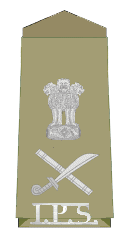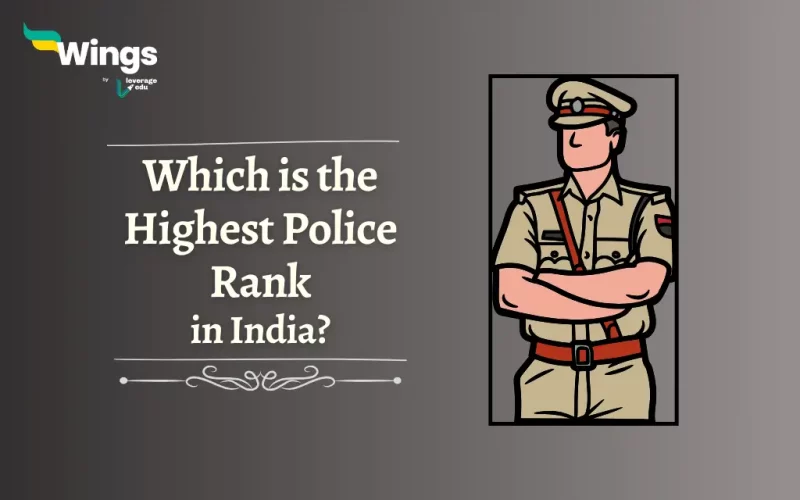Director General of Police or DGP is the Highest police rank in India. Undoubtedly, the DGP is the head of state police. Additional Director General of the police or ADG is the Second highest rank in the police. Police play an important role in maintaining the law and order of the State and UTs. According to the Indian Constitution, the rank of a police officer is a subject that comes under the State government. Moreover, an IPS officer can be considered the DGP officer of the state police.
Table of Contents
Facts about the Highest Police Rank in India- DGP
The rank of police officers in India is still based according to British Rule. At that time, the use of the Police was to control the people and not serve them. Additionally, the Director General of Police is the highest police rank in India and is appointed by the Indian Police Services Cabinet.
- Moreover, to be considered for the position of DGP one must have at least 33 years of service.
- DGP is often referred to as the State Police Chief as they usually hold the highest rank in the state police force in India.
- Additionally, the DGP holds a 3-star rank and is appointed by the Cabinet.
- There are additional officers within the police hierarchy who may hold the position of DGP at the state level.
- Furthermore, DGPs have Gorget patches on their collars, featuring a dark blue background adorned with stitched oak leaf patterns.

What is the Qualification of DGP?
Additionally, to qualify for the position of Director General of Police (DGP):
- The applicants must hold a bachelor’s degree.
- Moreover, they must be eligible for the UPSC test conducted by the Union Public Service Commission.
- Furthermore, they must have achieved the rank of an IPS officer.
Consequently, advancement through promotion is the sole pathway to the DGP role.
Must Read: Who was The First Woman Governor of an Indian State?
The Order of Police Rank in India
In addition, the Order of Police Rank in India is as follows:
- DGP– Director General of Police (Highest Rank in Police)
- ADGP – Additional Director General of Police
- IG– Inspector General of Police
- DIG – Deputy Inspector General of Police
- SSP – Senior Superintendent of Police
- SP– Superintendent of Police
- ASP – Additional Superintendent of Police
- DSP– Deputy Superintendent of Police
- ASP– Additional Superintendent of Police
- ASP – Assistant SP (usually IPS) or Deputy SP(HPS)
- IP – Inspector of Police
- SI – Sub-Inspector of Police
- ASI – Assistant Sub-Inspector of Police
- Head Constable
- Constable
- SPO’s
Also Read: Who was the First Governor General of India?
The Police Rank With Insignia
Moreover, the Police Rank with Insignia is:
- Insignia of DGP- Crossed Sword, Baton and State Emblem
- Insignia of IG- Crossed Sword, Baton and One Star
- Insignia of SP- State Emblem and One Star
- Insignia of DSP- Three Stars
- Insignia of ASP- State Emblem
Thus, apart from the DGP in the Police role, other officers too hold the rank of a DGP in different investigation or other government agencies. Moreover, they would include the Vigilance & Anti-Corruption Agency, the General Director of Fire Forces and Civil Defence, the General Director of Prisons, CID, and more.
FAQs
In metropolitan cities, the top police officer holds the title of “Commissioner of Police” (CP), while in smaller districts, they are known as the “Superintendent of Police” (SP). Moreover, at the state level, the highest-ranking position in the police force is the Director General of Police (DGP).
The DGP has to report to the state government or the Additional Chief Secretary of the Home Department or the Home Secretary. The Cabinet appoints the DGP.
Additional Director General of Police (ADGP) is the second highest police rank in India after the DGP.
An IPS officer can be appointed as Director General of Police after 30+ years of service in the Police. Otherwise, the most senior police officer can get appointed for this post.
Hope you have gotten all the relevant information about the Highest Police Rank in India! Moreover, you may even read more blogs and empower yourself with knowledge regarding Civics and Polity! If you want to know more about topics like this, then visit our general knowledge page!
 One app for all your study abroad needs
One app for all your study abroad needs













